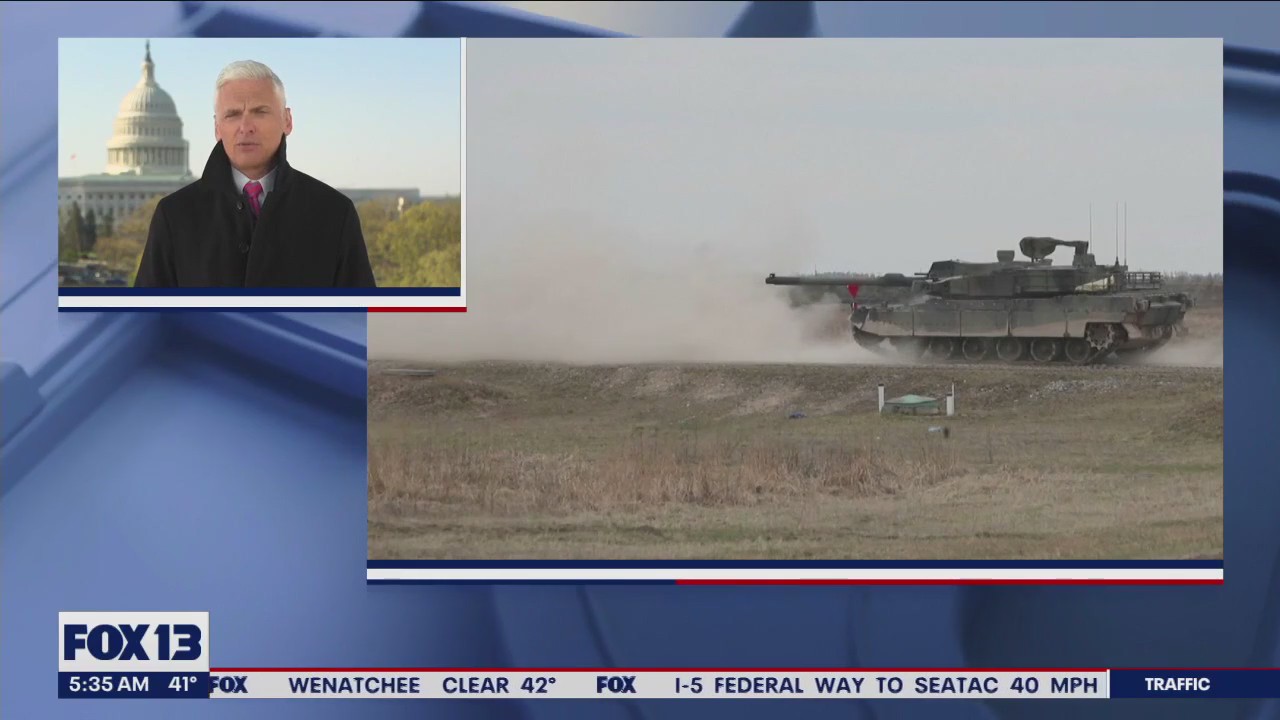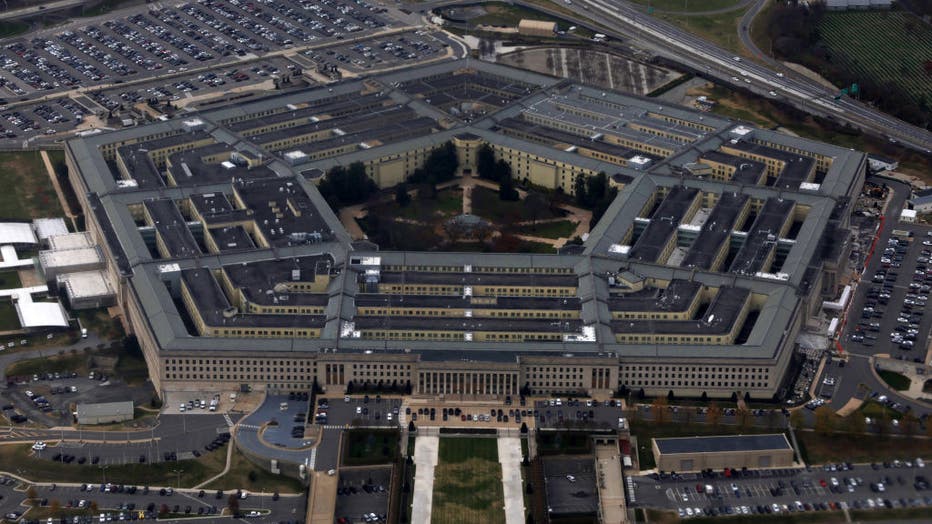What we know so far on the leaked Pentagon documents

Investigation into how leaked classified U.S. documents
There is rising concerns to find whoever is behind a leak of classified U.S. documents that has rocked the Pentagon. The Justice Department is investigating where the documents, first discovered online came from.
WASHINGTON - It’s been less than a week since news of highly classified military documents on the Ukraine war surfaced, sending the Pentagon into full-speed damage control to assure allies and assess the scope of the leak.
The information on scores of slides has publicized potential vulnerabilities in Ukraine's air defense capabilities and exposed private assessments by allies on an array of intelligence matters, raising questions about whether the leak will erode allies' trust in sharing information with the U.S. or impact Ukraine's plans to intensify the fight against Russia this spring.
Overall, the leaked documents present a "very serious risk to national security," a top Pentagon spokesman told reporters Monday.
This is a look at what the documents are, what is known about how they surfaced, and their potential impact.

The Pentagon is seen from a flight taking off from Ronald Reagan Washington National Airport on November 29, 2022 in Arlington, Virginia. The Pentagon is the headquarters of the U.S. Department of Defense and the world’s largest office building. (Pho
WHAT ARE THEY?
The classified documents — which have not been individually authenticated by U.S. officials — range from briefing slides mapping out Ukrainian military positions to assessments of international support for Ukraine and other sensitive topics, including under what circumstances Russian President Vladimir Putin might use nuclear weapons.
There's no clear answer on how many documents were leaked. The Associated Press has viewed approximately 50 documents; some estimates put the total number in the hundreds.
WHERE DID THEY COME FROM?
No one knows for sure, not even the Pentagon chief.
"They were somewhere in the web, and where exactly, and who had access at that point, we don’t know. We simply don’t know," Defense Secretary Lloyd Austin said at a press conference Tuesday. "We will continue to investigate and turn over every rock until we find the source of this and the extent of it."
It's possible the leak may have started on a site called Discord.
Discord is a social media platform popular with people playing online games. The Discord site hosts real-time voice, video and text chats for groups and describes itself as a place "where you can belong to a school club, a gaming group, or a worldwide art community."
RELATED: Ukraine investigating video purported to show soldier's beheading
In one of those forums, originally created to talk about a range of topics, members would debate the war in Ukraine. According to one member of the chat, an unidentified poster shared documents that the poster claimed were classified, first typing them out with the poster’s own thoughts, then, as of a few months ago, uploading images of folded papers.
The person who said he was a member of the forum told The Associated Press that another person, identified online only as "Lucca," shared the documents in a different Discord chat. From there, they appear to have been spread until they were picked up by the media.
Many details of the story can't be immediately verified. And top U.S. officials acknowledge publicly that they're still trying to find answers.
WHAT'S BEEN REVEALED
The leaks have highlighted how closely the U.S. monitors how its allies and friends interact with Russia and China. Officials in several countries have denied or rejected allegations from the leaked records.
The AP has reported on U.S. intelligence picking up claims from Russian operatives that they were building a closer relationship with the United Arab Emirates, the oil-rich Middle Eastern nation that hosts important American military installations. The UAE rejected the allegations, calling them "categorically false."
The Washington Post reported Monday that Egypt's president ordered subordinates to secretly prepare to ship up to 40,000 rockets to Russia as it wages war in Ukraine. A spokesman for the Egyptian foreign ministry said Egypt was maintaining "noninvolvement in this crisis and committing to maintain equal distance with both sides."
RELATED: Ukraine brings back 31 abducted children from Russia amid war
Other leaks have concerned allegations that South Korean leaders were hesitant to ship artillery shells to Ukraine and that Israel's Mossad spy service opposed Prime Minister Benjamin Netanyahu's proposed overhaul of the judiciary.
Funded at $90 billion annually, the U.S. intelligence agencies have sweeping powers to tap electronic communications, run spies and monitor with satellites. The results of those powers are rarely seen in public, even in limited form.
U.S. RESPONSE
The Pentagon has begun an internal review to assess the leak's impact on national security. The review is being led by Milancy D. Harris, the deputy undersecretary of defense for intelligence and security, a defense official said in a statement to AP. The team includes representatives from the offices of legislative affairs, public affairs, policy, legal counsel and the joint staff, the official said.
The Pentagon was also quickly taking steps to reduce the number of people who have access to briefings, a second defense official said. Both officials spoke on the condition of anonymity to discuss sensitive matters. Pentagon officials are also closely monitoring where the leaked slides are "being posted and amplified," said Chris Meagher, assistant to the secretary of defense for public affairs.
RELATED: Russia arrests Wall Street Journal reporter Evan Gershkovich on spying charge
Separately, the Justice Department has opened a criminal investigation into how the slides were obtained and leaked.
CIA Director William Burns on Tuesday called the leak "deeply unfortunate."
"It’s something that the U.S. government takes extremely seriously," he said in remarks at Rice University. "The Pentagon and the Department of Justice have now launched a quite intense investigation to get to the bottom of this."
WHAT'S THE IMPACT?
Senior military leaders have been contacting allies to address the fallout. That includes calls "at a high level to reassure them of our commitment to safeguarding intelligence and fidelity to our security partnerships. Those conversations began over the weekend and are ongoing," Meagher said.
U.S. officials are likely to face more questions when they travel to Germany next week for the next contact group meeting, where representatives of more than 50 nations gather to coordinate weapons and aid support for Ukraine. But the document leak is not expected to affect that meeting or allies' willingness to continue to provide military assistance to Ukraine, a senior defense official told The Associated Press, speaking on the condition of anonymity to discuss sensitive matters.
"I think a lot of the allies will probably be more curious about why it happened," said Chris Skaluba, director of the Atlantic Council's transatlantic security initiative. Given the high-level security clearance needed to access the information in the first place, the leak raises questions as to who "would have that much of an agenda to put it out there," and whether the intent was to undermine support for Ukraine, Skaluba said.
Austin on Tuesday contacted his South Korean counterpart, Defense Minister Lee Jong-sup, to discuss the leaked documents, several of which were particularly sensitive to Seoul because they described U.S. surveillance of its ally and detailed South Korean reservations about providing munitions directly to Ukraine.
RELATED: Pentagon releases video of Russian jet dumping fuel on US drone
The two defense chiefs agreed that a "considerable number" of the leaked documents were fabricated, Kim Tae-hyo, a deputy national security director, told reporters. He said the alliance between the two countries wouldn't be affected by the leak and South Korea would seek to further strengthen cooperation with the United States.
And both Austin and Secretary of State Antony Blinken reached out to their counterparts in Ukraine. Austin suggested Tuesday the leaks would not have much of an impact on Ukraine's plans for a spring offensive.
Ukraine’s strategy will "not be driven by a specific plan. They have a great plan to start and but only President Zelenskyy and his leadership really know the full details of that plan," Austin said.
For other sensitive issues highlighted in the leaked slides, such as Ukraine's shortage of air defense munitions, the shortage itself has been known and is one of the reasons U.S. military leaders have been pressing allies to supply whatever systems they can, such as the Iris-T systems pledged from Germany and the U.S.-manufactured Hawk air defense systems provided by Spain.
"Publicizing an apparent shortage of anti-aircraft missiles may give comfort to Russia. But if it energizes Ukraine’s partners to accelerate delivery of missiles and other air defense capabilities, Kyiv will be grateful. The bigger ‘known unknown’ is the extent to which these leaks influence U.S. political support for Ukraine," said Ben Barry, senior fellow for land warfare at the London-based International Institute for Strategic Studies.

